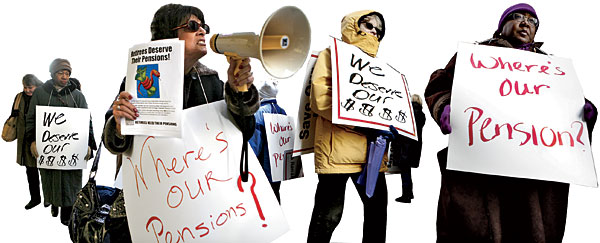
What with Governor Quinn’s Squeezy the Pension Python slithering into Illinois late last year—combined with dire warnings about what will happen if the state’s pension mess isn’t cleaned up pronto—most people have focused on the cuts that will have to happen to keep the fiscal ship from pulling a Titanic. The main question has been: Do Mike Madigan and his cronies in Springfield have the political will to do what needs doing? But there’s a question few are addressing that is even more important: Is pension reform legal?
Don’t laugh. Illinois is one of two states (the other is New York) whose constitution gives extraordinary protection to people who have public pensions coming to them. These pensions are contracts, “the benefits of which shall not be diminished or impaired.” In other words: All pension benefits here are guaranteed from the time a public employee is hired.
The key remedies being floated in most pols’ proposals—notably, raising retirement ages, increasing workers’ own contributions, and reducing cost-of-living adjustments in pension payouts—would result in benefits being diminished. Which would very likely violate that constitutionally protected contract. Which makes nearly certain that whatever pension fix lawmakers pass will wind up being contested in court. That battle could drag on for years, with Illinois’s fiscal mess worsening all the while.
How would such a legal challenge play out? Amy Monahan, an employee benefits law expert at the University of Minnesota Law School, says that Illinois could argue that it can—and routinely does—“cut” promised future benefits simply by firing an employee. In effect, the state could make the case that pension benefits that haven’t already been earned aren’t any more guaranteed than employment itself is.
Another argument the state could make, Monahan says, is that its inherent police powers allow it to change the pension system to ensure solvency. In 1998, Illinois pension officials tried a similar argument. It didn’t work. The state’s Supreme Court found that the pension funds were not at risk of bankruptcy, nor were the benefits at risk of being diminished.
But that was 15 years and two recessions ago. Today the numbers might look more compelling to a judge. “Even if the Illinois Supreme Court says pension benefits are contractual on day one for as long as that person is employed, the state can still make changes if it’s reasonable and necessary to serve an important public purpose,” says Monahan. Still, that’s a long shot, she admits.
A move that would be much more likely to pass legal muster: Start taxing public employees’ retirement income. John Cullerton, the senate president, made that very suggestion in 2010. “It would just be a matter of fairness,” he said. After all, pension income from other employers is typically taxed. [Clarification: In Illinois, retirement income is not taxed, but it is common in other states.]
Or Illinois could negotiate a tough deal with workers and pensioners similar to the one hammered out in 2012 between the mayor of Providence, Rhode Island, and local unions. It included a freeze on cost-of-living adjustments until the city’s retirement system is funded at a reasonably healthy 70 percent. But that would be more difficult at the state level, where most employees are unionized.
Failing all those, only one option remains: Scare up more money to meet existing pension obligations—a move that would have to win the approval of voters. Hey, how about charging admission to see Squeezy in action?
* * *
By the Numbers
The state’s pension problem is the worst in the nation. Here are some of the sobering figures.
$198.6 billion
Illinois’s total pension liability (as of June 2012)
$94.6 billion
Illinois’s total unfunded liability (as of June 2012)
40.4%
Percent of liabilities funded in Illinois (worst in the nation)
Compared to . . .
99.8%
Percent of liabilities funded in Wisconsin
71%
Percent of liabilities funded in Michigan
59.6%
Percent of liabilities funded in Indiana
$6,505
Unfunded liability per Illinois resident (in 2011)
SOURCES: Illinois Commission on Government Forecasting and Accountability; Morningstar
Photograph: Michael Tercha/Chicago Tribune


